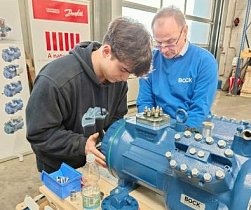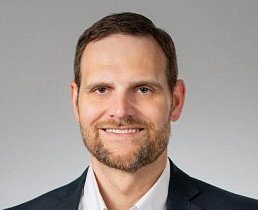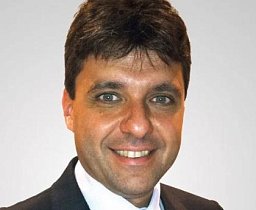
Emerson’s new CO2 Booster training unit is preparing to make several stops across the U.S. and Canada in 2019. Learn more about what this hands-on experience will offer attendees.
Adoption of the natural refrigerant CO2 (R-744) in commercial and industrial refrigeration applications is on the rise in North America and around the globe. With 0 ozone depletion potential (ODP) and a global warming potential (GWP) of 1, CO2 is considered the environmental standard by which other refrigerants are measured. But with its high operating pressures and unique performance characteristics, industry stakeholders have many questions about how to design, operate and service a CO2system. That’s why Emerson is pleased to introduce its new, mobile CO2 Booster training unit.
The CO2 training unit is designed to give contractors, manufacturers, wholesalers and end users a hands-on experience and learn what it’s like to work on a CO2 refrigeration system. Launched in Canada in September, the unit has already visited locations in Quebec and trained more than 50 contractors. In early 2019, the unit will travel to the U.S. and make several stops, starting with an appearance in the Atlanta area timed to correspond with the conclusion of the AHR Expo. The current schedule is as follows:
Each stop will feature a two-day training session designed to accommodate 20 attendees and cover a wide range of CO2-related topics, including:
Become familiar with CO2 and refrigeration system components
The open 360° view of the training unit allows attendees to familiarize themselves with the refrigerant and the components which make up a CO2 system. To demonstrate the volatility of CO2, the unit includes a phase change cell that shows how the refrigerant reacts to pressure changes. Starting in its liquid state, R-744 is subject to increasing pressures and begins its transition into a vapor state, then to a supercritical fluid, until it ultimately becomes a transparent gas. Then, as pressure is dropped within the cell, attendees can see the reverse of this transition as CO2 returns to a liquid state and then forms into a solid piece of dry ice.
The CO2 Booster training unit utilizes a full Emerson system that includes: low- and medium-temperature compressors, electronic controls, protectors, variable-frequency drives and transcritically rated electronic expansion valves. For ease of use, the unit is designed to improve the visibility of all components and dial gauges to demonstrate pressures and temperatures of certain elements.
The transportation container is designed for simplified transport and protection against the rigors of over-the-road travel. This container is also equipped with Emerson’s Cargo Solutions that allow live tracking of the unit’s location, ambient temperature and other conditions through Emerson’s Oversight app.
Registration for scheduled two day sessions is now open. The cost is $700 per person and includes all course materials, breakfast and lunch.
If you’re interested in learning more about CO2, be sure to reserve your spot (Class Title: CO2 Refrigeration) at an upcoming training session.

